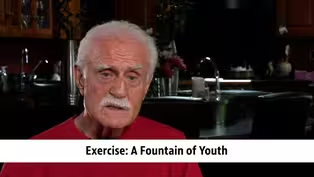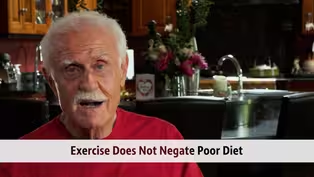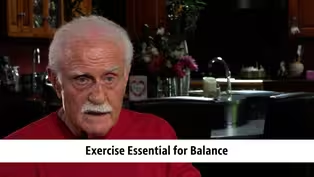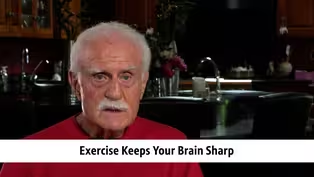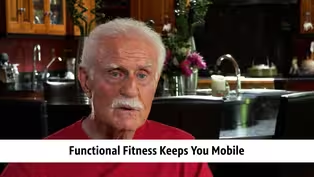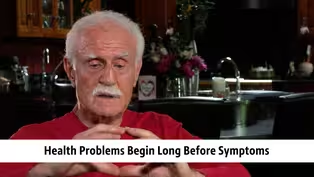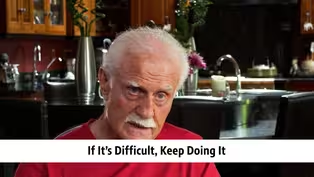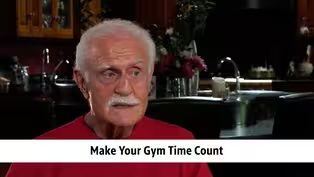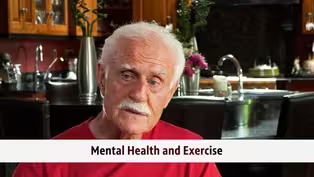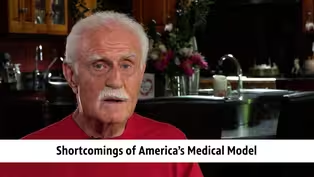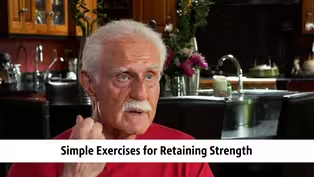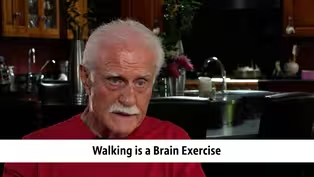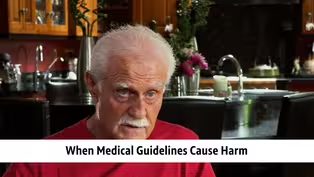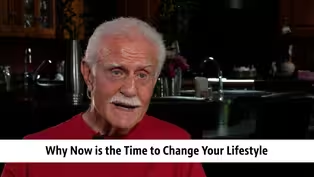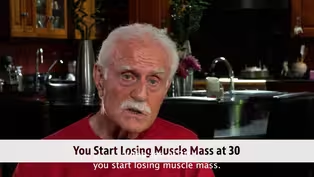KET Forums
You Need to Decide to Exercise
Clip: Episode 29 | 5m 44sVideo has Closed Captions
Dr. Bryant Stamford discusses the importance of deciding to exercise.
Dr. Bryant Stamford, professor of Kinesiology and Integrative Physiology at Hanover College, discusses the importance of deciding to exercise.
Problems playing video? | Closed Captioning Feedback
Problems playing video? | Closed Captioning Feedback
KET Forums is a local public television program presented by KET
KET Forums
You Need to Decide to Exercise
Clip: Episode 29 | 5m 44sVideo has Closed Captions
Dr. Bryant Stamford, professor of Kinesiology and Integrative Physiology at Hanover College, discusses the importance of deciding to exercise.
Problems playing video? | Closed Captioning Feedback
How to Watch KET Forums
KET Forums is available to stream on pbs.org and the free PBS App, available on iPhone, Apple TV, Android TV, Android smartphones, Amazon Fire TV, Amazon Fire Tablet, Roku, Samsung Smart TV, and Vizio.
Providing Support for PBS.org
Learn Moreabout PBS online sponsorshipThe main thing is you have to decide.
Years ago, we were doing research on why do this when I was at University of Louisville.
Why do we gain so much weight so quickly when we quit smoking?
I mean, it's all it's the amount of weight gain.
If you've ever met somebody or know somebody who has quit smoking, the amount of weight gain is is beyond what seems to be physiologically possible.
I mean, you think like, okay, like I just saw Jane or Bill the other day and they were fine.
Then I see them a month later after they gained £20.
Okay.
And I know they're not going to a smorgasbord three times a day.
Okay.
So it defies it defies all the general principles of weight management in a sense.
So our goal was, okay, we we want to examine this and understand how much of it is due to overeating.
Okay.
You've lost that that oral appeasement kind of thing and you've lost the ritual and so forth and so on.
So are you eating more?
And how much of it is the lost metabolic effect of the nicotine, which boosts your metabolic rate and you burn more calories just because of the nicotine all day long?
All right.
So but the point in the story is this, that I got a grant from the American Heart Association to do this research.
All right.
And we sent out a press release and we decided that we wanted to to work with postmen or women.
We wanted to work with women because we knew they would follow the rules much better than men.
And we wanted them to be postmenopausal.
So we didn't have to deal with the menstrual cycle when all of that hormonal changes.
So we put out a press release and I got funding and we were going to work with 20 women, put out a press release, and in two days we got 1250 responses of women who wanted to be in our study.
So we opted to 50, which still wasn't, you know, we opted to 50, got more money.
Then we began to interview people.
All right.
And it was interesting that women would come in and we would select them on the basis of I remember this one woman in particular.
I mean, she was almost like sobbing.
She was so, so much wanting to get in my study.
She so much wanted to quit smoking.
And she called me several times a day before we alerted her that, yes, you've been selected.
She called me several times a day, just pleading with me to be in the study.
That's how badly she went.
Quit smoking.
Well, in my naivete, I thought, here's a lock.
She's perfect.
She's she's going to do really well.
She wants this so badly.
So what we did was we followed them for six weeks while they kept smoking.
We brought them into our laboratory every week for a series of tests.
Okay.
So in other words, this is what life is like while you're smoking, metabolically and so forth and so on.
Then on D-Day and everybody knew after six weeks you stopped smoking and we set up everything we could.
Okay.
We had counselors.
We had a hotline.
We had a hypnotist.
Okay.
Everything you can imagine set up to help them quit smoking.
This woman who begged me to be in the study didn't make it through.
The first day of quitting.
Did not make it through the first day of quitting.
Okay, that's an extreme story.
But long story short, we started with 50 women.
We ended up with six who made it through the next six weeks, six out of 50.
Despite all the work we put into them.
Six of them made it.
All right.
So we decided we need to do this again.
Okay.
And so this time we went through exactly the same procedure, sitting down, just like you and I are sitting here interviewing people.
And again and again, we selected the people who most wanted to quit.
All right.
But this time, we videotaped everything.
We had exactly the same bad results this time.
So I sat down with the video recordings.
What are we doing wrong?
What are we doing wrong?
And finally, I was like, Duh.
Here's one.
Here's the video recording of someone who was successful.
Here's a video recording of somebody who wasn't successful.
This person really, really, really wanted to quit, but they had decided that they were going to quit.
They wanted to get into our study to have us help them to decide to quit.
So decide becomes this huge word.
Okay, this person over here was successful.
You know what?
You can tell by the nature of her responses she was going to quit anyway.
She had decided she was going to quit and she wanted to be in our study to help her do this.
That and the other thing.
Okay.
So this word decide.
You say, well, what is it that has to happen?
You have to decide that it's important to you.
If you don't do that, all these gimmicks that you pointed out like, oh, I'll get a buddy or do this or give yourself a dollar every time you take a walk or who knows what, None of that works.
You have to decide that it's important to you.
That gets back to why are you thinking about doing this in the first place until you decide you're wasting your time.
No.
Video has Closed Captions
Clip: Ep29 | 2m 23s | Dr. Bryant Stamford discuss how exercise is a fountain of youth. (2m 23s)
Exercise Does Not Negate Poor Diet
Video has Closed Captions
Clip: Ep29 | 2m 30s | Dr. Bryant Stamford discusses how exercises does not negate poor diet choices. (2m 30s)
Exercise is Essential for Balance
Video has Closed Captions
Clip: Ep29 | 1m 6s | Dr. Bryant Stamford discusses how exercise is essential for balance. (1m 6s)
Exercise Keeps Your Brain Sharp
Video has Closed Captions
Clip: Ep29 | 3m 22s | Dr. Bryant Stamford discusses how exercise keeps your brain sharp. (3m 22s)
Functional Fitness Keeps You Mobile
Video has Closed Captions
Clip: Ep29 | 2m 56s | Dr. Bryant Stamford discusses how functional fitness keeps you mobile. (2m 56s)
Health Problems Begin Long Before Symptoms
Video has Closed Captions
Clip: Ep29 | 2m 41s | Dr. Bryant Stamford discusses how health problems begin long before symptoms start. (2m 41s)
If It's Difficult, Keep Doing It
Video has Closed Captions
Clip: Ep29 | 4m 38s | Dr. Bryant Stamford discusses why it is important to keep doing exercises that are difficult. (4m 38s)
Video has Closed Captions
Clip: Ep29 | 1m 39s | Dr. Bryant Stamford discusses why it is important to make your gym time count. (1m 39s)
Video has Closed Captions
Clip: Ep29 | 2m 58s | Dr. Bryant Stamford discusses the connection between mental health and exercise. (2m 58s)
Shortcomings of America's Medical Model
Video has Closed Captions
Clip: Ep29 | 2m 26s | Dr. Bryant Stamford discusses shortcomings of America's medical model. (2m 26s)
Simple Exercises for Retaining Strength
Video has Closed Captions
Clip: Ep29 | 2m 19s | Dr. Bryant Stamford discusses some simple exercise ideas that can help you retain strength. (2m 19s)
Video has Closed Captions
Clip: Ep29 | 2m 12s | Dr. Bryant Stamford discusses how walking is a brain exercise. (2m 12s)
When Medical Guidelines Cause Harm
Video has Closed Captions
Clip: Ep29 | 5m 25s | Dr. Bryant Stamford discusses how medical guidelines can sometimes cause harm. (5m 25s)
Why Now is the Time to Change Your Lifestyle
Video has Closed Captions
Clip: Ep29 | 4m 34s | Dr. Bryant Stamford discusses why now is the time to change your lifestyle. (4m 34s)
You Start Losing Muscle Mass at 30
Video has Closed Captions
Clip: Ep29 | 6m 55s | Dr. Bryant Stamford discusses how you start losing muscle mass at 30. (6m 55s)
Providing Support for PBS.org
Learn Moreabout PBS online sponsorship
- News and Public Affairs

Top journalists deliver compelling original analysis of the hour's headlines.

- News and Public Affairs

FRONTLINE is investigative journalism that questions, explains and changes our world.












Support for PBS provided by:
KET Forums is a local public television program presented by KET
